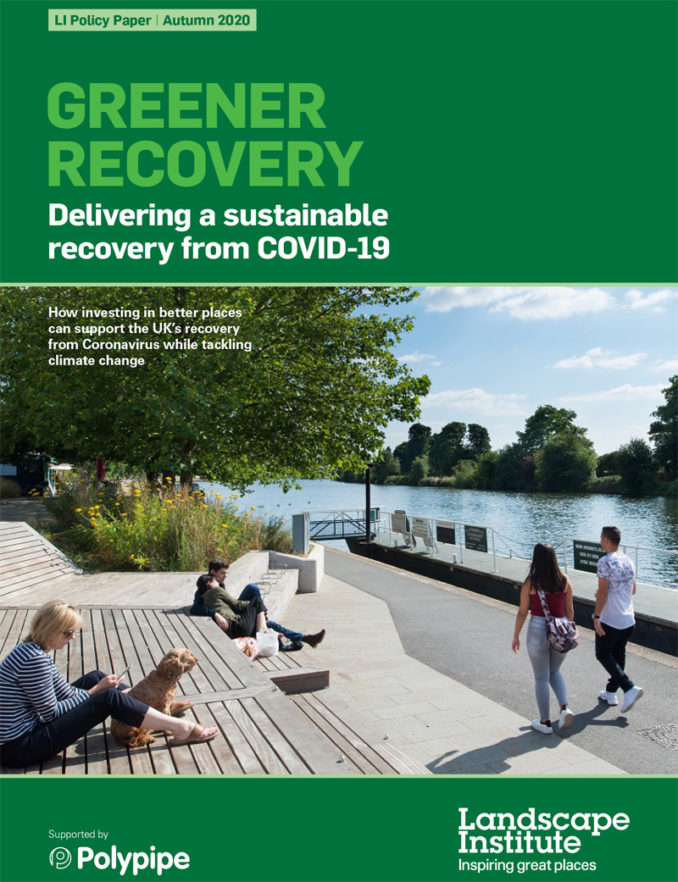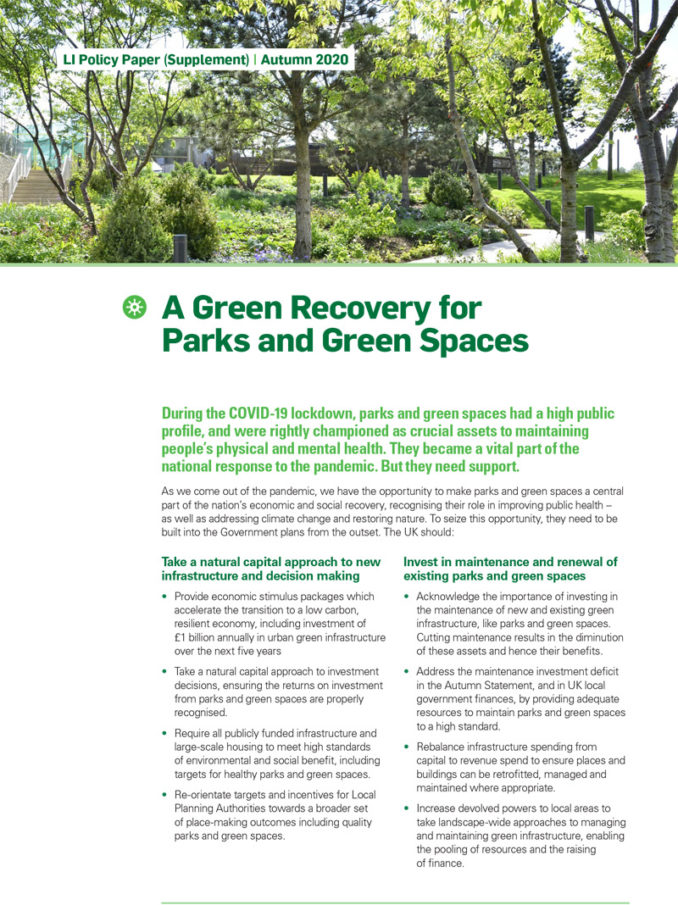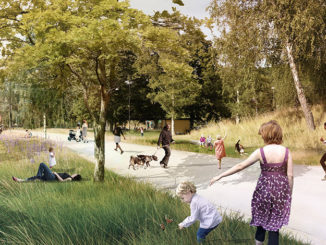New Greener Recovery report calls for a major shift from grey to green development as part of the UK’s COVID-19 recovery
The Landscape Institute (LI), recently published a new report: Greener Recovery – Delivering a sustainable recovery from COVID-19. It calls on the UK Government to use its upcoming Autumn Statement to announce a much-needed investment in parks and green spaces.
England is in danger of lagging behind the devolved administrations, with the Scottish Government already announcing significant investment in new green development. Without a bold step change, the LI says, the UK is in danger of defaulting to ‘business as usual’. It supports calls for the investment of £1billion per year for the next five years into parks and green spaces across the UK, seizing this once-in-a-generation chance to tackle climate change and biodiversity loss, revitalise the economy, and create new jobs.
The LI insists that public money should not fund unsustainable, unhealthy, poorly- designed spaces. The new report calls for ‘shovel-worthy’, not just ‘shovel-ready’ projects, delivered in ways that address climate change, prioritise communities most in need, and improve our quality of life.
Regular outings have been a lifeline for many during the lockdown. As a result of the COVID-19 pandemic, communities across the UK value time in green spaces more than ever. But lockdown has also starkly highlighted the huge inequality of access. One in eight households (12%) in Great Britain has no access to a private or shared garden. In England, black people are nearly four times as likely as white people to have no access to outdoor space at home.
Yet the investment in our parks and green spaces have been shockingly poor, with falls in both maintenance and developer contributions in the last six years. There is no shortage of evidence that we are missing health and wellness benefits from underperforming parks. We can no longer afford to stand by and let this continue.
Jane Findlay, President of the Landscape Institute
As well as addressing funding and access to parks, the report tackles issues relating to the proposed new planning rules – and raises several concerns that the LI’s members have encountered for decades.
The Greener Recovery report highlights the enormous benefits even a modest reallocation of the money spent on grey infrastructure could bring. Recent research suggests that a £5.5bn investment in urban green infrastructure over five years would generate over £200bn of physical and mental health benefits.
We know that for every £1 spent on park maintenance, we get £7 of health, climate and environmental benefits back. Parks are crying out for urgent investment, and we ask the government to think long and hard about how their recovery plans will prioritise these crucial national assets.
Right now, we lack the number of people we need with green skills. We want to partner with the government to accelerate support through apprenticeships, training and learning. We want to get more people into the green jobs of the future: into designing, planning and managing our parks, places and landscapes.
Dan Cook, CEO of the Landscape Instititute
Greener Recovery addresses climate change, green space standards, and skills. Its recommendations to government include:
- Take a ‘natural capital’ approach to investment: ascribing tangible value to our natural resources, helping us achieve a low-carbon economy.
- Invest in natural solutions to climate change that will create jobs, bolster the economy and protect nature.
- Give local governments more powers and funds to maintain their landscapes and parks.
- Rebalance infrastructure spending so that we properly green, manage and maintain buildings and outside spaces.
- Deliver national tree strategies that make thriving natural ecosystems an important part of local planning.
- Set national targets for urban trees, and make sure that if developers promise trees, these trees appear – and stay.
- Introduce living roofs and walls to new developments nationwide and incentivise retrofitting living roofs and walls to our existing buildings.
- Invest in green skills, offering training, apprenticeships and accreditation to help those most affected by the COVID crisis reskill for a low-carbon economy.
- Bolster the green workforce, addressing problems such as the lack of diversity, skills shortages, and the loss of important public sector roles.
The Greener Recovery report was kindly sponsored by Polypipe and written by the Landscape Institute, with input from the LI’s Policy Committee, Advisory Council and College of Fellows. A major contribution has been made from leaders in its new Parks and Green Space Network, as well as from its individual members.
You can download a full copy of the Green Recovery report here[PDF] and the additional parks & green space supplement here [PDF].





